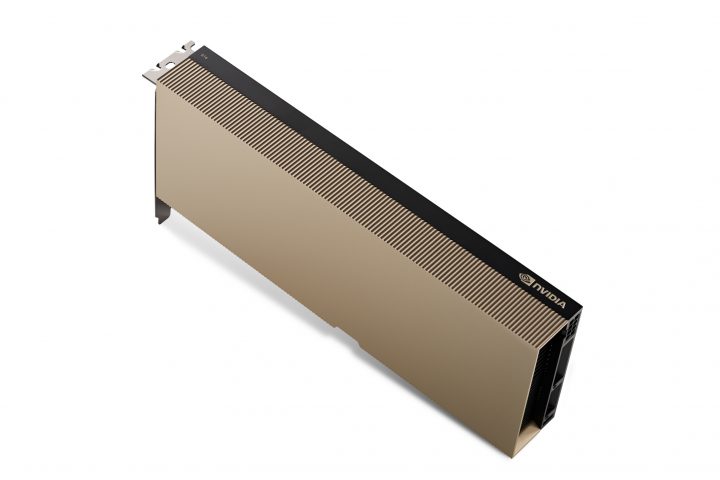NVIDIA announces eight new NVIDIA Ampere architecture GPUs for next-generation laptops, desktops, and servers.

NVIDIA mentioned that the new NVIDIA RTX GPUs would enable artists to create 3D scenes, let designers produce architectural buildings in real-time, and allow engineers to create products on any system.

The new NVIDIA RTX A5000 and NVIDIA RTX A4000 GPUs for desktops feature RT Cores Tensor Cores and CUDA cores to speed AI, graphics, and real-time rendering up to 2x faster than previous generations, the company claims.
On the other hand, the NVIDIA RTX A2000, A3000, A4000, and A5000 laptop GPUs are intended for professionals needing thin and light devices. These GPUs are said to deliver accelerated without compromising mobility. With the inclusion of the latest Max-Q, RTX technology, and NVIDIA Studio, these can enhance creatives apps optimal for both performance and reliability.


Next are the NVIDIA A10 GPU and A16 GPU that are available for the data center. The A10 provides up to 2.5x the virtual workstation performance compared to its previous generation. The A16 GPU, on the other hand, provides up to 2x user density with a lower total cost of ownership and an enhanced virtual desktop infrastructure experience.
According to NVIDIA, the A10 and A16 GPUs deliver more power, memory, and speed from graphics and AI to VDI when combined with NVIDIA RTX Virtual Workstation (vWS) and NVIDIA Virtual PC (vPC) software.
Among the first to tap into the RTX A5000 is Woods Bagot, a global architectural and consulting practice.
“This new NVIDIA Ampere GPU microarchitecture is a huge leap forward. I was shocked by the performance gain I saw with the NVIDIA RTX A5000 versus the equivalent model previous generation RTX when running applications such as Chaos Vantage and NVIDIA Omniverse,” said Robert Cervellione, studio leader of Design Technology at Woods Bagot.
The new NVIDIA RTX GPUs feature the latest generation of NVIDIA RTX technology. The new RTX laptop GPUs also include the latest generation of NVIDIA Max-Q technology that enables a powerful system that is thin and light. Additionally, RTX technology powers NVIDIA Omniverse, the platform that delivers high-performance, accurate simulation for complex 3D worlds and true real-time ray- and path-traced renders.
Furthermore, NVIDIA mentioned that all the NVIDIA RTX GPUs feature the latest technologies in the NVIDIA Ampere architecture, including the following:
• Second-Generation RT Cores – Up to 2x the throughput of the previous generation, with the ability to run concurrent ray tracing, shading, and denoising tasks.
• Third-generation Tensor Cores – Up to 2x the throughput of the previous generation, up to 10x with sparsity, with support for new TF32 and BFloat16 data formats.
• CUDA Cores – Up to 2.5x the FP32 throughput of the previous generation for significant increases in graphics and compute workloads.
However, desktop GPU features and technology include:
• Up to 24GB of GPU memory – Doubles the memory of the previous generation, the RTX A4000 with 16GB GDDR6 memory and the RTX A5000 with 24GB of GDDR6 memory both support ECC memory. The RTX A5000 is expandable up to 48GB of memory using NVIDIA NVLink to connect two GPUs.
• Virtualization – The RTX A5000 supports NVIDIA RTX vWS software for multiple high-performance virtual workstation instances that enable remote users to share resources to drive high-end design, AI, and compute workloads.
• PCIe Gen 4 – Doubles the previous generation’s bandwidth and speeds up data transfers for data-intensive tasks such as AI, data science, and creating 3D models.
Lastly, Laptop GPU features and technology are as follows:
• Third-Gen Max-Q technology – For thin and light laptops that perform quieter and more efficiently with Dynamic Boost 2.0, WhisperMode 2.0, Resizable BAR, and NVIDIA DLSS technology.
• Up to 16GB of GPU memory – For the largest models, scenes, assemblies, and advanced multi-application workflows.
NVIDIA also introduced the NVIDIA T1200 and NVIDIA T600 laptop GPUs, based on its previous generation Turing architecture, designed for multi-application professional workflows.

Meanwhile, the new NVIDIA RTX desktop GPUs and NVIDIA data center GPUs will be available from global distribution partners and OEMs starting later this month. The new NVIDIA RTX desktop GPUs are expected to be available in the second quarter of this year from global OEMs.
The post NVIDIA intros 8 new RTX GPUs for Artists, Designers, Engineers and Virtual Desktop Users appeared first on YugaTech | Philippines Tech News & Reviews.
Source: Yugatech




No comments:
Post a Comment